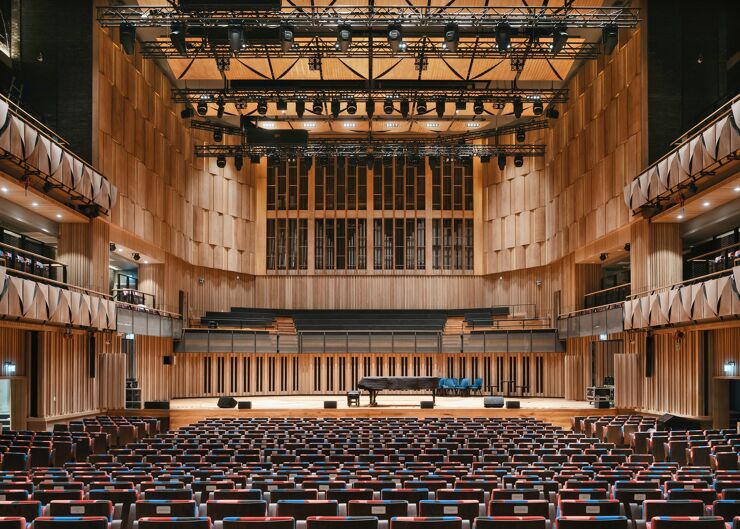
NEC has been used to deliver a very challenging refurbishment of a major historic concert hall in Bristol, UK. Client Bristol City Council and operator Bristol Music Trust let the much-needed modernisation of the grade II listed 1867 Colston Hall – now called Bristol Beacon – to Willmott Dixon under an NEC3 Engineering and Construction Contract (ECC) Option A (priced contract with activity schedule) through the Southern Construction Framework in March 2019. Mace was appointed as the NEC project manager and the client’s architect was Levitt Bernstein.
The venue had been extensively altered over its 150-year life. In 1873 a foyer and small hall were added to the Colston Street frontage; the main hall was rebuilt following major fires in 1898 and 1945; and in 2009 a modern three-storey foyer was added to form a new frontage on Pipe Lane. However, bringing the remainder of the venue up to date was complicated by the need to retain the unstable façade, the uncertainties of previous reconstructions and the challenges of working through Covid-19, supply shortages and high inflation.
After demolition of the main roof and interior, a massive 120 t bird-cage scaffold was installed to support the external walls. Around 1,000 t of concrete was then poured to strengthen the foundations, which included two levels of disused cellars. The main hall roof and interior, and the interior of the small hall, former foyer and cellars, were then completely rebuilt.
Deed of variation
In January 2021 the council appointed Arcadis, supported by Arup and Mott MacDonald, as its strategic partner for delivery of new infrastructure, homes and regeneration. In view of mounting costs and delays on the Bristol Beacon project, including due to uncharted wells, unexpected asbestos and missing foundations, the contract was changed through a deed of variation in April 2021. Arcadis took over as NEC project manager and the contractor’s design responsibility was limited to the new works, with the client taking over design responsibility for the existing structure.
![]() The £132 million transformation was finally completed to the agreed revised schedule and budget in November 2023. With a total floor area of 8,400 m2 over eight floors, the state-of-the-art, fully accessible, refurbished building provides a 2,124 capacity main hall, 500 capacity small hall, 250 capacity cellar venue and a 110-seat restaurant in the former foyer. It also achieved a BREEAM ‘very good’ environmental rating, with 127 kW of roof-top photoelectric panels helping to reduce carbon dioxide emissions by 54%.
The £132 million transformation was finally completed to the agreed revised schedule and budget in November 2023. With a total floor area of 8,400 m2 over eight floors, the state-of-the-art, fully accessible, refurbished building provides a 2,124 capacity main hall, 500 capacity small hall, 250 capacity cellar venue and a 110-seat restaurant in the former foyer. It also achieved a BREEAM ‘very good’ environmental rating, with 127 kW of roof-top photoelectric panels helping to reduce carbon dioxide emissions by 54%.
Phil Gibby of Arts Council England, which provided £22 million of funding, says, ‘This major refurbishment cements the Beacon as one of Europe’s flagship venues.’ The building won the Retrofit Project of the Year in the 2024 British Construction Industry Awards.
Building a collaborative relationship
The client’s project director John Betty of Hammonds PMS, who was appointed in September 2020 and later seconded to Arcadis, says the NEC requirement to act in a ‘spirit of mutual trust and co-operation’ was essential to getting the challenging project over the line.
‘NEC set the scene for building and then rebuilding a solid, respectful and collaborative relationship between the client, the contractor and the supply chain. This fully came into play once we had reset and de-risked the contract in 2021.’
Betty says the NEC early warning and compensation event process was used extensively by both parties. ‘During the first couple of years over 800 compensation events were notified, resulting in significant increases in time and cost and a growing tension between the parties. Following the reset in 2021, we increased the frequency of early warning and risk-reduction meetings to at least every day, ensuring we properly identified and mitigated all risks to cost and time at the earliest opportunity.’
Despite suffering further setbacks, he says NEC-inspired collaboration and risk-management processes helped to ensure the project achieved the fixed deadline for reopening in November 2023. ‘Thanks to everyone working together to achieve this common objective, we were able to start running test events two months before the hard opening date. Furthermore, apart from some additional external works that needed to be carried out during the defects period, the final account was settled on completion.’
Betty adds, ‘the steadfast nature and political will of client Bristol City Council and the collaboration and support of Bristol Music Trust as the tenant and operator were also vital to ensuring successful completion and opening on time.’ The British Construction Industry Awards judges said they were, ‘particularly impressed with the collaborative approach and agility adopted by the team to resolve the challenges discovered with the site.’
Benefits of using NEC
- NEC requirement to act in a ‘spirit of mutual trust and co-operation’ was essential to getting the challenging project over the line.
- NEC flexibility allowed the contractor’s design responsibility to be reduced during construction, helping to de-risk the contract.
- NEC early warnings and risk-reduction meetings ensured all risks to cost and time were identified and mitigated at the earliest opportunity, resulting in the venue opening date being achieved and the final account being settled on completion.



